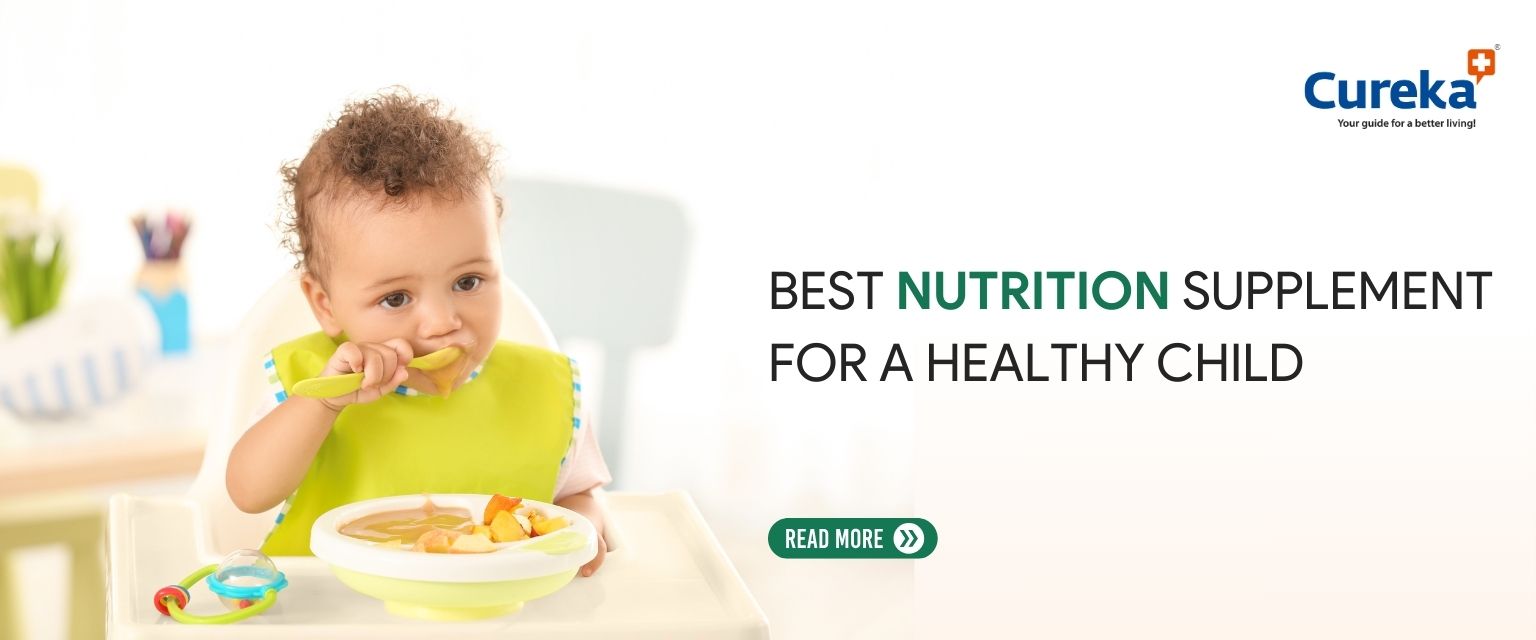Best Nutrition Supplement for a Healthy Child
Medically Reviewed By:
Dr. Hema Sathish M.B.B.S., D.D(UK)
Dermatologist, Founder of Cureka
Ensuring that children receive the right important nutrition during their formative years is essential for their physical and cognitive development. From conception to early childhood, proper nourishment plays a crucial role in shaping a child’s health. Nutrition, especially during the first 1000 days, sets the foundation for growth, immunity, and brain development. However, as children grow, their nutritional needs evolve, and many parents turn to vitamins for kids and protein supplements to fill gaps in their child’s diet.
In this blog, we’ll explore the best nutrition supplements for children in India and provide insights into the use of essential vitamins, protein supplements, and how they fit into a child’s overall diet.
The First 1000 Days: A Critical Window for Development
The period between conception and the first two years of life is crucial for healthy growth and brain development. Adequate nutrition during this time helps prevent irreversible damage to a child’s development, especially in brain function and linear growth. Children have high nutritional needs during this time, and insufficient nourishment can have lasting effects on their health.
After this period, continuing to provide children with a balanced diet that includes all vitamins and important nutrients is necessary to promote healthy physical and cognitive development.
Essential Nutrients for Healthy Growth
As children grow, their nutritional needs become more diverse. While most nutrients can be obtained from a healthy diet, many children in India do not eat a balanced variety of foods, which may result in nutrient gaps. Parents often consider dietary supplements to ensure their children receive essential vitamins and minerals, especially if their diet lacks sufficient fruits, vegetables, or proteins.
Here are some of the most essential vitamins for kids:
- Vitamins for Kids
Vitamins play a critical role in maintaining children’s health. Parents often opt for multivitamins to ensure their children receive the necessary nutrients. Commonly recommended vitamins for kids include:
- Vitamin A: Supports healthy vision, skin, and immune function.
- Vitamin C: Boosts the immune system and helps with tissue repair.
- Vitamin D: Important for bone growth and calcium absorption, especially in children with limited sun exposure.
- Vitamin E: Protects cells from damage and supports immune function.
- Vitamin K: Aids in blood clotting and bone health.
In India, where a large portion of the population may have limited access to a variety of nutrient-dense foods, particularly in rural areas, vitamin supplements can be a practical solution. Many Indian children are prone to vitamin D and iron deficiencies, making essential vitamins a key part of their diet. Vitamin supplements can be a useful tool in overcoming these deficiencies.
- Protein Supplement
Protein is essential for muscle growth, tissue repair, and overall development. While most children get enough protein through their diet, some may benefit from a protein supplement. This is particularly important for vegetarian or vegan families, which are common in India. If children do not get enough protein from traditional sources like dairy, lentils, or nuts, protein supplements can help.
For children involved in physical activities or sports, a protein supplement can support growth and energy levels. Popular protein sources in India, like paneer, dal, and soy, should be combined with a well-balanced diet to meet a child’s protein needs.
- Omega-3 Fatty Acids
Omega-3 fatty acids, found in fish oil, are important for brain development, cognitive function, and eye health. In India, where fish consumption is often lower in central and northern regions, omega-3 supplements can be beneficial. Omega-3 is available in both plant-based (flaxseed, chia seeds) and fish-based supplements, ensuring that even vegetarian children can benefit from this essential nutrient.
The Use of Dietary Supplements in India
The use of dietary supplements in India is growing, particularly in urban areas. However, caregivers’ perceptions of dietary supplements vary widely. Some see supplements as a necessary way to ensure children get all the essential nutrients, especially when they are picky eaters or have limited access to a variety of foods. Others prefer that children receive their nutrients from a healthy, balanced diet.
Key Findings on Supplement Use in India:
- Multivitamins and Iron Supplements: Iron deficiency is a common problem among Indian children, especially in rural areas where access to iron-rich foods is limited. Multivitamins that contain iron, vitamin C, and folic acid are commonly used to address this gap.
- Calcium and Vitamin D: Calcium and vitamin D are crucial for healthy bone growth. In a country where many children may not spend enough time outdoors, vitamin D deficiency can become a significant issue. Calcium supplements are also popular among families who follow a vegetarian diet that lacks sufficient dairy products.
- Probiotics and Omega-3: Probiotic supplements are gaining popularity in India to promote gut health, especially in children who frequently suffer from digestive issues. Omega-3 supplements are also common in areas where fish consumption is low.
However, studies show that many caregivers in India provide these supplements without consulting healthcare professionals. This lack of medical advice could lead to overuse or incorrect supplementation. Therefore, it is always recommended to consult a doctor or nutritionist before introducing any supplements into a child’s diet.
Are Supplements Necessary for Your Child?
While dietary supplements can be beneficial, the focus should always be on a well-balanced diet. Whole foods such as fruits, vegetables, grains, and lean proteins are the best sources of nutrition for children. Supplements should be viewed as an additional measure to fill any dietary gaps rather than a replacement for nutritious foods.
For example, if a child is not getting enough vitamin D from sunlight and food, a supplement might be necessary. Similarly, children who do not consume enough protein may benefit from a protein supplement. However, for most healthy children with balanced diets, regular multivitamins or protein supplements are not always necessary.
Conclusion
Providing a healthy, balanced diet is the cornerstone of good nutrition for children in India. While the first 1000 days are critical for laying the foundation for a child’s physical and cognitive development, ongoing nutrition is equally important as they grow. Vitamins for kids, protein supplements, and vitamin supplements can all be useful tools to ensure children meet their nutritional needs, especially when dietary gaps exist.
Before introducing supplements, it is best to consult with a healthcare provider to determine if they are necessary and which ones are most appropriate for your child. By doing so, you can ensure that your child receives the essential vitamins and nutrients they need to thrive.
FAQ’s
1. When might a child need a nutrition supplement?
Supplements are usually considered when a child is a very fussy eater, has medical or growth concerns, or follows a restricted diet that makes it hard to meet nutrient needs from food alone. A healthcare professional can check growth charts, review eating patterns, and advise whether a multivitamin, fortified drink, or targeted nutrient supplement is appropriate.
2. Which vitamins and minerals are most important for growing children?
Key nutrients include vitamins A, B‑complex, C, D, and E, plus minerals such as calcium, iron, iodine, zinc, and magnesium. They support bone development, immune function, energy production, and healthy vision, so supplements often focus on covering gaps in these nutrients when diet alone is not enough.
3. Are nutrition drinks and fortified shakes safe for everyday use?
Complete pediatric nutrition drinks are generally designed to be safe when used in the recommended amounts and under medical guidance, especially for children who struggle to eat enough. They should complement balanced meals rather than replace solid foods, and parents should watch total calories and sugar so the child’s appetite for regular food is not reduced.
4. How do I choose the right supplement for my child?
Look for age‑appropriate products that list clear amounts of each vitamin and mineral, avoid excessive megadoses, and limit unnecessary sugar, colours, and flavours. Before starting, discuss options with a pediatrician or dietitian, especially if your child has health conditions, takes medications, or already uses other fortified foods.
5. Can supplements replace a healthy diet for children?
No, even high‑quality supplements cannot substitute for a varied diet that includes fruits, vegetables, whole grains, dairy or alternatives, and protein‑rich foods. Supplements are best used as a temporary or supportive measure to fill specific gaps while families continue working on balanced eating habits.
References :
- Use of dietary supplements by children and adolescents – Oct 2023 – https://www.ncbi.nlm.nih.gov/pmc/articles/PMC10960193/
- Nutrition in Toddlers – 2018 Aug – https://pubmed.ncbi.nlm.nih.gov/30215978/
- Effectiveness of Nutritional Strategies on Improving the Quality of Diet of Children from 6 to 12 Years Old: A Systematic Review – Jan 2022 – https://pubmed.ncbi.nlm.nih.gov/35057552/
- Nutrition and growth in children – 2022 Dec – https://pubmed.ncbi.nlm.nih.gov/32731734/











